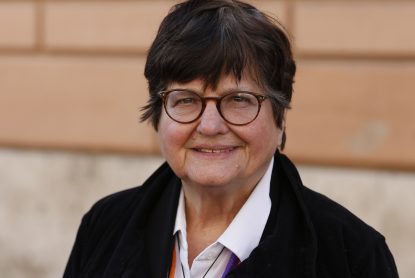
Sister Helen Prejean, a Sister of St. Joseph of Medaille is seen in this 2016 file photo. (CNS photo/Paul Haring)
WASHINGTON (CNS) — The three federal executions initially scheduled for the second week of January are now on hold.
On Jan. 11. a federal judge granted one of these death-row inmates, Lisa Montgomery, a temporary stay of execution pending a competency hearing. The other two other executions also were halted because the inmates tested positive for COVID-19.
The next afternoon, a federal judge for the U.S. District Court for the District of Columbia halted the executions scheduled for Corey Johnson and Dustin Higgs Jan. 14 and Jan. 15, respectively, due to their risk of increased suffering because of COVID-19 lung damage. The two inmates tested positive for the coronavirus in December.
Catholic leaders have been pleading for an end to the death penalty and urging leaders to stop this practice, particularly with three executions that were initially scheduled to take place between Jan. 12-15.
[hotblock]
The judge for the U.S. District Court for the Southern District of Indiana who granted Montgomery the temporary reprieve Jan. 11 announced there would be a hearing to determine if Montgomery is competent to be executed under the Eighth Amendment of the U.S. Constitution.
Sister Helen Prejean, a Sister of St. Joseph of Medaille and longtime death penalty opponent, was quick to temper any feeling of victory. She has been pleading Montgomery’s case and stressing that she has needed mental help, not the death penalty.
“This is good news but not a guarantee that Lisa’s execution is called off. The Justice Department is already working to appeal the stay and the case will likely go all the way to the SCOTUS,” she tweeted Jan. 12, using an abbreviation for the Supreme Court of the United States.
A judge for the U.S. District Court for the Southern District of Indiana granted Montgomery the temporary reprieve Jan. 11 announcing there would be a hearing to determine if Montgomery is competent to be executed under the Eighth Amendment of the U.S. Constitution.
Her attorney, Kelley Henry, said in a statement that the court made the right decision, noting that “Montgomery has brain damage and severe mental illness that was exacerbated by the lifetime of sexual torture she suffered at the hands of caretakers.”
In 2004, Montgomery attacked and killed a pregnant woman, cut her open and took the woman’s baby.
[tower]
In a nearly 7,000-page clemency petition submitted in early January to President Donald Trump, Montgomery’s lawyers detailed their client’s claims of physical abuse, rape and torture as well as being sex trafficked by her mother.
“Everything about this case is overwhelmingly sad,” the petition said. “As human beings we want to turn away. It is easy to call Mrs. Montgomery evil and a monster, as the government has. She is neither.”
The American Medical Association is calling on Acting Attorney General Jeffrey Rosen and the Justice Department to postpone the federal executions scheduled for the second week in January, saying in a Jan. 11 letter that recent executions have turned into COVID-19 super-spreader events.
The day before Montgomery’s stay was granted, Holy Cross Father John Jenkins, president of the University of Notre Dame, said her execution was one of three in his home state during the second week of January, adding to the nine already executed in the past six months by the federal government.
“President Trump, whose administration has expressed a commitment to defend the sanctity of human life, has the power to stop this inhumane, unprecedented and unnecessary spree of executions pursued by his Justice Department in the waning days of his administration. I urge him to do so,” he said in a statement.
The Catholic university president called Montgomery’s now-pending execution “particularly troubling,” saying it “illustrates some of the many systemic failures in our system of capital punishment. The victim of severe child abuse and sexual violence herself, Montgomery committed a crime so heinous and bizarre that it raises serious questions about her mental state.”
He stressed that the “most fundamental objection to the death penalty, though, is that it undermines our commitment to the sanctity of all human life — healthy or infirm, talented or ordinary, good or bad. Death-row inmates have been convicted of some of the most awful crimes imaginable, yet even their lives do not lose that dignity.”
The Catholic Mobilizing Network also has spoken out against Montgomery’s execution along with initially planned federal executions of Johnson and Higgs. It is holding virtual prayer vigils on the afternoon of each scheduled execution and is planning to still do so Jan. 12 for the final date that had been set for Montgomery’s execution. Participants can sign up online at https://catholicsmobilizing.org/virtual-vigils.
The group launched an online petition campaign asking President-elect Joe Biden to make it a priority to end federal executions once he is sworn into office, urging the incoming administration to “uphold the sacred dignity of every person” and make good on its promises to dismantle the federal death penalty system.
The petition names several possible avenues toward abolition the president-elect could pursue, including declaring an official moratorium on federal executions, commuting the death sentences of all those currently on federal death row and advocating to end the death penalty in law.
The last suggestion was taken up in late afternoon Jan. 11 when Sen. Dick Durbin, D-Illinois, the incoming chair of the Senate Judiciary Committee, and Rep. Ayanna Pressley, D-Massachusetts, announced plans to introduce legislation seeking an end to the federal death penalty.
“There are three lives that hang in the balance this week alone,” Pressley said in an interview with NPR, hours before Montgomery’s stay was announced. “This is why we reintroduced this bill this week and are urging Congress to act immediately to pass it. State-sanctioned murder is not justice.”
PREVIOUS: Elected officials need a ‘public servant’s heart,’ Schwarzenegger says
NEXT: Federal court continues hold on Arkansas laws restricting abortion



Share this story